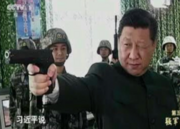|
Since war is one of only two human endeavors whose purpose is the total destruction of an opponent's way of life (the other being marriage), it enjoys a special place in all our hearts. So why not talk about how it all works? About Me I'm the proud holder of a newly minted Master's Degree in Military History from Norwich University. My primary research projects focused mainly on the military history of Russia/USSR and so-called "Ways of War," but I'd be happy to delve into anything from the Atomic Bomb to the Hundred Years War, to Xenophon and the Ten Thousand. I love talking about this stuff, and I'd like to keep myself in good form as I go out for interviews! Why Military History? I tried Cultural History, but examining the History of the Penis just wasn't for me. Military History, on the other hand, offers interpretations of some of the most violent, disruptive, and ultimately significant events from our past. Plus, it's about guns, swords, cannons, phalanxes, legions, etc. Some might say, "Why waste your time on such barbaric nonsense?" Well, as the well-known aphorism goes, "Those who do not know history are doomed to repeat it." This article is a good introduction to the problem of widespread misunderstanding of humanity's military past. In my opinion, the currently fashionable concept of a "Western Way of War" is the direct result of poor understanding of both Western and non-Western Military History, and has had a truly tragic effect on the way Western nations have approached military conflicts in the recent past. So what are some possible topics? There are a lot of things to talk about here. Not all Military History involves the "pointy end of the stick." Logistics, technology, philosophy, and many other fields all play a part. Want to know why Rommel was basically doomed from the start in North Africa? How about why firearms were adopted in Europe more rapidly than in China, even though gunpowder was invented in the Orient? What was the Greater East Asia Co-Prosperity Sphere? Who's that Clausewitz guy Gene Hackman jokes about in Crimson Tide? It's all fair game. Full Disclosure There are some topics that I have developed strong opinions about, such as the aforementioned "Ways of War," as well as other subjects mostly related to the impact of culture on warfare. If one of these topics comes up, I will always declare my opinon in advance, then proceed to try and present both sides of the argument in a fair way. So ask away!
|
|
|
|

|
| # ? Apr 26, 2024 05:11 |
|
Well, as a Finn, I'd like to hear a third-party view on the border conflicts between Finland and Soviet Russia (Aunus expedition and the "kinship wars") in the aftermath of the first world war (1919 I believe) and how they are seen both in Russian/USSSR history context and western anti-bolshevik effort. Did they influence Soviet Russian (military) mentality with regards to outsiders/Scandinavia? Were they covered in western insitutions? What was their likelihood of them actually succeeding? Really, even a general american perspective (no matter how dismissive  ) would be appreciated. I've been a military history hobbyist and I've been intensely fascinated with it for a long time, especially 16th-17th century warfare, so I'll be checking this regularily ) would be appreciated. I've been a military history hobbyist and I've been intensely fascinated with it for a long time, especially 16th-17th century warfare, so I'll be checking this regularily 
|
|
|
|
Describe the modern Revolution in Military Affairs as it applies to fighting insurgencies. Additionally, describe the paradigm sift in terrorism between Maoist and contemporary tactics, and how it applies to Clausewitz.
|
|
|
|
What do you know about the border skirmishes between the PRC and Soviet Union during the Cold War years?
|
|
|
|
war. what is it good for?
|
|
|
|
How does having the U.S. Army commander-in-chief being a civilian affect the logistics of U.S. involvement in wars? Is the title just a safeguard against military coups or do they actively make decisions affecting their involvement in wars? Would wars have turned out differently if it was somebody in the military? Would our involvement in Iraq and Afghanistan be different? Edit - I just realized we're probably not the only ones with this type of system. If you want to be more broad, examples from other countries are fine. College Rockout fucked around with this message at 18:02 on Apr 28, 2010 |
|
|
|
I've watched the show "Deadliest Warriors" a few times and have often cringed at their "science". Based on you studies, are there any particular units that could have stood up against another military "Age" unit that was considered more advanced. Like the Spartans against Teutonic Knights... could their bronze weapons have even hoped to be levered into a knights armpit or neck between armor? Would the knights have simply trampled over a formation of Spartans? In a more modern corollary I think of things like the guerrilla tactics using old Soviet equipment in city sieges against the US in Iraq to some effect.
|
|
|
|
What kind of horrifying, insanely gory stuff can you tell us about the American Civil War? We've been discussing it in my history class, but my professor is not a military historian, so the lectures have been centered around political aspects. This will not do. I demand BLOOD Thanks in advance
|
|
|
|
Tell me about the differences of the British and French soldiers in the French and Indian Wars and what kind of strategy they implemented in later wars than in the earlier?
|
|
|
|
Talk me some Battle of Tsushima Strait. What should I know that isn't in the Wiki?
|
|
|
|
Okay, some really good questions here! Veor's question about the Revolution in Military Affairs is a rather sticky subject, so I'm going to wait until I have a little more time to delve into that one, but I'll answer some of the others right away. First, quote:I'd like to hear a third-party view on the border conflicts between Finland and Soviet Russia (Aunus expedition and the "kinship wars") in the aftermath of the first world war (1919 I believe) and how they are seen both in Russian/USSSR history context and western anti-bolshevik effort. The Heimosodat, or "Kinship Wars," between Finland and the newly formed Russian Soviet Federative Socialist Republic received little attention outside the actual area concerned, namely the Karelian Peninsula. In truth, most of the Western Powers of the time (Britain, France, and an emerging US) were perfectly happy to see some upstart Finns keep the Bolsheviks occupied. Indeed, they had little immediate impact even within the region itself, since all the gains made by Finland were basically annulled by the Treaty of Tartu in 1920. Because this string of what basically amounted to ethnic border disputes had no real bearing on Western Europe and the US, they are basically ignored here. In the Soviet Union, however, they eventually became very significant. The troubles along the Finnish border coincided exactly with a war between the Soviet Union and Poland. This war was of much more interest to Western powers, as it presented the Soviets with an opportunity to extend their influence right up to Germany's borders. Indeed, they almost did. It was only a dramatic battle outside Warsaw that eventually stopped the Red Army. In any case, the difficulties presented by these numerous border conflicts convinced some elements of the Soviet government that more attention needed to be paid to consolidating Communist power at home before further expansion was attempted. The growing power of this group eventually led to the downfall of Leon Trotsky and the rise of Josef Stalin. This change in emphasis from fomenting revolution across Europe to creating a Communist fortress in the Soviet Union itself was a turning point in the course of International Communism's development. Furthermore, the regional tensions persisted throughout the 20's and 30's, eventually erupting in the Winter War of 1939-1940. During this conflict, the Finns heroically resisted a Soviet invasion, basically stopping the Red Army dead in its tracks. This war saw the advent of the Molotov Cocktail, among other things. While the Soviet defeat was largely the result of inept leadership, Stalin and his cronies forced the military to completely revamp their tactical doctrines in favor of his "permanent operating factors." As a result, the Red Army was in a state of doctrinal chaos when Germany invaded in 1941. As to whether or not the Finns had any chance of succeeding, it's unlikely. The goal of the "Kinship Wars" was to unite ethnic Finns and free them from Russian oppression. Given the power of the Russian military even at that time, I doubt the Finns would have been able to retain the entire Karelian Peninsula had they been able to take it.
|
|
|
|
quote:I've watched the show "Deadliest Warriors" a few times and have often cringed at their "science". Deadliest Warrior is a show that I absolutely love to hate. Their tests are basically pointless, and their conclusions are no better. Even so, I'd be lying if I said I didn't get a kick out of it. Anyway, it's basically impossible to make meaningful comparisons between such widely varying combatants because they're taken entirely out of context. It's unlikely that anything like Teutonic Knights ever would have developed in mountainous Greece, while the Helot system that allowed Spartans to train so extensively for war never existed in Germany (unless you count Prussia). In any case, the disparity between different "ages" of weaponry can be misleading, as your allusion to Iraqi insurgents suggests. Using your example of Teutons vs. Spartans, cavalry, no matter how well armored, would be ineffective against the front end of a phalanx since horses will refuse to charge a solid object bristling with spear points. Against the flanks or rear, however, they would have a better chance. But, if the combat was taking place in Greece, the Spartans most likely would have positioned themselves between two impassable pieces of terrain to avoid such an event. Think Thermopolae. Even if the Teutons were able to get around the flanks, though, Spartans were renowned for their ability to seeminlgy flee in panic and then, as a cohesive unit, turn around and face a totally unprepared enemy. Could Spartan spears find chinks in German armor? Possibly, given the huge amounts of time Spartans devoted to training. Remember that the Huns and Mongols, both using primitive weapons and organization, were able to make mincemeat out of numerous European armies that were using all the latest military doodads like catapults and stirrups. This was because the nomadic steppe people practiced war as an extension of everyday life. They literally lived on their horses and needed to be expert archers to survive. It basically comes down to how well adapted a soldier is to his current combat environment.
|
|
|
|
quote:How does having the U.S. Army commander-in-chief being a civilian affect the logistics of U.S. involvement in wars? Civilian leadership of the military absolutely has an impact on how wars are prosecuted. For example, Franklin Roosevelt decided very early on that the primary focus of American involvement in World War II should be in Europe. This was despite the fact that, in military terms, Germany posed virtually no threat to the United States, while Japan had already dealt a near crippling blow and continued to defeat American forces throughout the Pacific. From a military standpoint, then, Japan was a much more immediate problem. Another thing to consider is that, in modern history anyway, military dictators are usually failures when it comes to military undertakings. Most of Hitler's victories occurred before he took direct control of the army. Stalin was an abysmal failure as a strategist and tactician. The military governments of Egypt and Syria were totally defeated by Israel in the Six Day War. Argentina's military junta fatally miscalculated in its invasion of the Falklands. Part of the reason for this is that military leaders often fail to grasp the overarching political situation. In Clausewitzian terms, war is an extension of politics by other means. In other words, if you don't have definite and realistic political goals, you won't be successful if you undertake an offensive war. BIAS ALERT As far as the United States' involvement in Iraq and Afghanistan, I think civilian leadership has certainly affected the progress of those conflicts. To begin with, the "War on Terror" is a civilian idea that doesn't make much sense. Terror is a tactic, nothing more. So, declaring a war on terror is akin to declaring a war on flanking. What are the actual political goals here? Has anyone really articulated them? Until some solid political goals, instead of vague ideas like freedom and democracy, are stated, it's not really possible to direct military effort effectively. As hard as it may be to believe, our political leaders have failed to do this.
|
|
|
|
What's your opinion of how awesome the British are.
|
|
|
|
Admiral Snackbar posted:... Thanks for answering my Deadliest Warriors question above. Concerning this... how does this correlate with someone like Alexander the Great or Napoleon? Was the political goal total domination or was the ominous goal the reason for the failure?
|
|
|
|
Is the concept of a "special forces" unit a fairly recent invention (as in, post-1800's or so) or does it go back further? If so, where did it get its start? Not trying to be a goony armchair green beret here, I just find the highly-trained small strike team a little more interesting than the usual rank & file of other units.
|
|
|
|
Jarlaxle posted:Is the concept of a "special forces" unit a fairly recent invention (as in, post-1800's or so) or does it go back further? If so, where did it get its start? Not trying to be a goony armchair green beret here, I just find the highly-trained small strike team a little more interesting than the usual rank & file of other units. What about ninjas?
|
|
|
|
ODC posted:I've watched the show "Deadliest Warriors" a few times and have often cringed at their "science". What if Napoleon had a B-52 at Waterloo?
|
|
|
|
Former history student myself, but never got a straight answer on this one. In the battle of Agincourt, could a British longbow actually penetrate a french full plate armour like traditional history books wants it to? Or was Englands victory owed to other factors?
|
|
|
|
We always hear about the longbow being one of the greatest military leaps ever. What are some of the other less obvious ones?
|
|
|
|
INTJ Mastermind posted:What do you know about the border skirmishes between the PRC and Soviet Union during the Cold War years? The border tensions between China and the USSR actually began during the waning years of Imperial China. In 1915 Russia forced China to recognize the autonomy of Outer Mongolia. Although this treaty was formally renounced by the Bolsheviks when they came to power in 1919, they actually reiterated its terms in secret clauses of a new agreement. At the same time, they prompted the conversion of Outer Mogolia's government into a mirror of other Soviet states. Eventually it became the Mongolian People's Republic, and a Soviet satellite. During the early years of World War II, the USSR hammered out agreements with Japan that further diminished China's authority over its northern territories. These had largely to do with the puppet-state of Manchukuo that the Japanese had set up in mainland China, but the effect was that the Soviet Union made numerous inroads toward establishing further influence in Chinese territory. When Mao Zedong's communists gained control of China in 1949, he traveled to Moscow to meet with Stalin. At this meeting, the two leaders agreed to respect all former Sino-Russian and Sino-Soviet treaties, making changes "as needed." To Stalin, this meant that if there were no future negotiations, there could be no disputes. Mao, however, expected future talks to settle what he considered unresolved border demarcation problems, including the status of Mongolia. As the 50's progressed, the Soviet Union sided with India in its border dispute with China, thus increasing tensions. Furthermore, China's leadership strongly disapproved of Nikita Khrushchev's attempts at "peaceful coexistence" with the West. These disagreements culminated with the Sino-Soviet split of 1960, in which each government began to openly disagree with and criticize the other. Throughout the 1960's there were literally thousands of small border skirmishes in which China tried to reassert its control over historically Chinese territories, while the USSR did the same to cement its hold over them. Making matters worse, Leonid Brezhnev sent Soviet troops into Czechoslovakia in 1968, thereby signalling his willingness to interfere in, and even invade, other communist countries. So, by 1969 tensions were very high between the two nations. It was at this point that the storm broke. In March of 1969, a small contingent of Chinese soldiers invaded the Soviet controlled island of Zhenbao (Damansky to the Russians). After a brief skirmish, which left 20-30 Russian casualties, the Chinese retreated. The Soviets then retaliated two weeks later. In the ensuing nine hour battle, the Russians and Chinese fought back and forth across a frozen river until Russian artillery finally broke the Chinese formations. The Chinese retreated, having sustained some 800 casualties. This incident was to have significant consequences. The Chinese felt that their People's Liberation Army had fared much better than might have been expected, and therefore found new confidence in its abilities. They still doubted their chances in an all out war, however. So, who did they turn to for support? Yup, the good old United States. It was at this time that Richard Nixon decided that China was less of a threat than the USSR, and so China and the US decided to team up against poor old Leo Brezhnev. The result for the USSR was a real problem. The Russians now faced significant threats to both East and West, and found it necessary to triple their miitary presence along the Chinese border. This meant weakening their deployments in Eastern Europe, which subsequently meant greater a emphasis on new technologies was needed to make up the difference. This eventually played right into the hands of Ronny Raygun, who proceeded to taunt the USSR into spending more than it could sustain in a new arms race, thus hastening the fall of the Soviet Union.
|
|
|
|
Reset_Smith posted:What kind of horrifying, insanely gory stuff can you tell us about the American Civil War? And blood you shall have, as soon as I get a chance to look up some first hand accounts! As a quick glimpse of the nastiness of the Civil War, I can tell you that there were many instances where the fighting devolved into hand-to-hand combat. Men of course used their rifles as clubs, but biting, clawing, and eye-gouging were certainly not uncommon. There are multiple accounts of second and third wave assaults having to crawl their way up mounds of first wave corpses in order to assault enemy ramparts. Artillery craters, which offered some cover on the battlefield, were often filled with men hiding among the remains of their comrades who had been standing in the way of the incoming shell. Add to this the propensity of leaders on both sides to present nice, orderly lines of fresh meat to gunsights of the enemy, and you've got lots of gory mayhem!
|
|
|
|
BUCKET OF FARTS posted:What's your opinion of how awesome the British are. This is it, right here This also answers Omits-Bagels posted:war. what is it good for? Admiral Snackbar fucked around with this message at 00:56 on Apr 29, 2010 |
|
|
|
What are your thoughts on the conspiracy theory that the Allies knew Pearl Harbor was going to get attacked and let it happen in order to force America into the war? I don't know much about it but my friend was talking about it the other day so I'd like to see what you think.
|
|
|
|
Who is the greatest military-tactician/leader in history?
|
|
|
|
err posted:Who is the greatest military-tactician/leader in history? I'm not a military history person, but can I throw in a vote for David Ben-Gurion and William Sherman? edit: What effect did the six-days war in 1967 have on Middle East politics as a whole, would you say? edit2: Also, obligatory Zhukov throw out. He was the man. Corny fucked around with this message at 02:14 on Apr 29, 2010 |
|
|
|
ThisButch Banner posted:Former history student myself, but never got a straight answer on this one. In the battle of Agincourt, could a British longbow actually penetrate a french full plate armour like traditional history books wants it to? Or was Englands victory owed to other factors? and this Lincoln posted:We always hear about the longbow being one of the greatest military leaps ever. What are some of the other less obvious ones? are somewhat related to this Veor posted:Describe the modern Revolution in Military Affairs as it applies to fighting insurgencies. so I'll try to give a comprehensive answer. I don't intend for this to be a specific response to Veor's question, which I'll try to provide soon, but rather as a general response to the idea of "Military Revolutions." I'll begin with the longbow. The most immediately impressive thing about a long bow is, in fact, its length, sometimes in excess of 6 feet. This allows an extraordinarily long draw on the string, which, in turn, enables very long arrows to be used. In contrast, a typical recurve bow spans about 4 feet, with a correspondingly shorter draw. The extended draw of the longbow resulted in a draw weight almost four times that of a typical recurve. Greater draw weight = greater range and speed of the arrow. These, combined with the increased mass of the arrow due to its greater length, resulted in a projectile that could, in fact, puncture plate armor of the time. So far, so good. An equally important factor in the longbow's construction, however, was its simplicity. A longbow is made from a single piece of wood, unlike a composite recurve which is made of a layer of horn, a layer of wood, and a layer of sinew. As a result, longbows are far easier to craft. Indeed, English archers often fashioned their own bows, since they were primarily huntsmen to begin with, and therefore accustomed to such necessities, but also because each bow had to be made to match its user's height. So, the longbow was a very effective and easily obtained weapon. Effective + Cheap = Great, like an AK-47. The downside to the longbow was that it was incredibly difficult to provide sustained fire since its use was very tiring. In order to compensate for this, large numbers of archers were necessary to provide constant volleys. Again, this was not too much of a problem for the English, since a large portion of the English male population learned to use the bow from a very young age. Given the fact that the longbow's design was not particularly remarkable, I think it goes without saying that it was not revolutionary. What was different was the way the English employed it. This new tactic was fundamentally a defensive one. It could not be used in the offense, since the basic formation was not a mobile one. Therefore, the English had to establish themselves on a hilltop and await an enemy attack in order to have any hope of success. Who would be stupid enough to fall for this, you ask? Why, The French, of course! Bound by the ideals of chivalry, heavily armed and armored French knights did not concern themselves with those lowly woodsmen to either side. No, they had their eyes on the real prize: the English nobles in the center! "Hey Pierre, if we charge right up the middle, we can capture ourselves some Riche Anglaises and ransom them for Beaucoup Euros!" "Oui Oui, Francois! They're not even on horses, so they can't run away!" "Alons-y!!" Well, those stubborn French knights did indeed charge up the middle and subsequently got slaughtered by arrows on many occasions, the three most famous of which were Crecy in 1346, Poitiers in 1356, and Agincourt in 1415. The funny thing is, on each of these occasions the English were actually on their way back out of France! Remember how I said that the English tactic was a purely defensive one? Well what happened was the English army would enter France on a Chevauchee, or large-scale raid. The French would wait to pursue the English until they were burdened down with all their newly acquired loot, and then try to catch them before they got back to English soil. Unfortunately this meant that the English army was almost always on the defensive when an encounter finally occurred! So basically the French pretty much shot themselves in the foot. And the head. Repeatedly. For a hundred years. Now what does this have to do with Military Revolutions (or Revolutions in Military Affairs in the modern lingo)? Well, from one point of view, it was the longbow that enabled the English to defeat numerically superior French forces on multiple occasions. Such victories would have been impossible without its use. The longbow's introduction to the battlefield therefore constituted a Revolution in the way battles, and therefore wars, were fought. Is this accurate? I don't think so. BIAS ALERT In my view, the longbow would not have made a lick of difference without the proper tactics, which were developed gradually over time. Twenty years went by between the first really purposeful use of English archers at Boroughbridge and the mature tactics used at Morlaix. A revolution that took twenty years? And remember that the longbow had already been in use by the peasantry long before its military use became widespread. This is where the idea of Military Revolutions becomes really problematic. If you really look into the component factors of different RMA's as they're sometimes called, you have to keep expanding the amount of time it took for these factors to actually mature into something "Revolutionary." Eventually, the Revolutions end up occurring over decades, or even centuries. Not much of a revolution, in my opinion. The Gunpowder Revolution is an excellent example of this, and one that I'm sure we'll hit on eventually. Admiral Snackbar fucked around with this message at 05:07 on May 10, 2012 |
|
|
|
With the amount of war you've pored over, do you feel a slight disconnect with current conflicts? That is to say,do you look at them more as a object to study as opposed to something horrific? I think I'm wording this poorly, but you get the idea.
|
|
|
|
This is kind of a broad question, but what's your general opinion on the effectiveness of spear and pike tactics? It seems among a lot of casual strategy gamers that any sort of long pointy stick throughout the ages has a reputation as being what you handed out to your untrained peasants who weren't worth training with "real weapons", and if you mention anything about Switzers or tercios then you get the response "yeah well if pikes are so great how come Rome based its legions around swords
|
|
|
|
Could you give a brief (or maybe not so brief) overview of how infantry doctrines changed between the creation of rapid-firing firearms, through WWI and up to the end of WWII? Maybe tanks too, in case my existing knowledge has gaping holes I'm not aware of.
|
|
|
|
Admiral Snackbar posted:And blood you shall have, as soon as I get a chance to look up some first hand accounts! As a quick glimpse of the nastiness of the Civil War, I can tell you that there were many instances where the fighting devolved into hand-to-hand combat. Men of course used their rifles as clubs, but biting, clawing, and eye-gouging were certainly not uncommon. There are multiple accounts of second and third wave assaults having to crawl their way up mounds of first wave corpses in order to assault enemy ramparts. Artillery craters, which offered some cover on the battlefield, were often filled with men hiding among the remains of their comrades who had been standing in the way of the incoming shell. Add to this the propensity of leaders on both sides to present nice, orderly lines of fresh meat to gunsights of the enemy, and you've got lots of gory mayhem!  Loving it so far!
|
|
|
|
What are some of the more interesting battles that you've studied? The Battle of Caanae and Hannibal are incredibly interesting to me. Can you comment on him? Was he the only reason that Carthage managed to survive as long as it did? I understand this is broad, I'm really just looking for some interesting stuff on Hannibal. Also, Scipio Africanus is a badass name. Can you comment on the British Empire during the American Revolutionary War? I've heard that the only reason American won was because Britain was more concerned about the going-ons of their other holdings in the empire. What else were they dealing with during this time? Also, this thread is great, I've always found military history to be fascinating and it's great to have a place to ask random questions.
|
|
|
|
Who dropped the biggest ball in Vietnam? Can you say anything in particular about the proxy wars between the U.S. and the U.S.S.R in (I'm pretty sure) Laos and Thailand? Also, what are your thoughts on Genghis Khan? By the way, awesome name/topic combo, lieutenant fish-man. OregonDonor fucked around with this message at 03:35 on Apr 29, 2010 |
|
|
|
Did anyone consider an amphibious landing in the West like Gallipoli in order to outflank the trenches during WWI? Was it the naval stalemate that prevented such an idea? Also, Zulu is the best war film of all time. Great pic! Hmm speaking of Zulu, why didn't the Zulu just surround the British at Rourkes Drift and attack from every direction since they had 40 to 1 numerical superiority? I don't know how accurate the movie is but it just looks like they made a lot of half assed frontal assaults. Spartan421 fucked around with this message at 03:42 on Apr 29, 2010 |
|
|
|
What are your opinions on the Invasion of Poland in 1939? What major factors lead to Poland's defeat? Was there any chance for Poland to NOT lose? Was Poland really militarily inferior?
|
|
|
|
Would the Nazis still be around if Hitler was killed early on?
|
|
|
|
Voted 5 for your ridiculous knowledge of military history. Well done. I've been sucked in by History Channel's "America" miniseries and it raised an interesting question to me. I think one story coming from this that I've heard is how armies up to (and even past) that war often just lined up and shot at each other before finally charging with bayonets, until the revolutionaries adopted more guerilla tactics to combat the Brits. What I'm most interested in is, from a historical point of view as well as that of the combatants, how were these tactics viewed? Was it really something brand new never used in that era of warfare, completely despicable, and/or something the redcoats really couldn't deal with? Or was it more of a common/accepted tactic of the time than I realize, that was more easily dealt with?
|
|
|
|
Admiral Snackbar This is a great thread. I am interested in the Vietnam conflict from 1954, when the Geneva Elections were cancelled and the US supported Ngo Dinh Diem, until the Vietnam fight against China in 1979 at the border to VN's invasion of Cambodia. Insights on tactics and how strategies, timing, public opinion worked in favor of the NVA and VC and against the RSVN (Republic of South Vietnam) and the US? Thanks in advance.
|
|
|
|
Historians always come with smart reasons why countries behave like they did. For example, in Germany the usual culprit is Hitler; all the smart decisions were taken by brilliant generals, while the bad decisions somehow trace back to Hitler. While I'm pretty sure Hitler was responsible for a lot of bad decisions, I think that it became an easy option to just blame him for every bad jugement; but, never mind, he was mad, and blaming him is usually pretty accurate. Now, the Japanese Army is a mystery. I was watching a program the other day, and a British soldier that retreated through Burma was saying "they were wonderful soldiers; they threw everything they had at you... they had a fantastic drill". I think that's a pretty accurate description of the IJA at tactical level. The usual description of the IJA is that they took at a strategic level the same concepts that worked at a tactical level: be very aggressive, stay in the offensive, do a lot with little resources, trust the spirit to overcome numerical and material disadvantages. That is easy explanation, but... hmm... I don't know. My point is: IJA's generals were not stupid, yet they took over the country and directed it at all the wrong directions. Tracing that back to a "Samurai spirit" is easy, but I'm not sure how accurate, as the generals spend a lot of time studying strategy -- what is not a Samurai thing. The leader of any army does not think like an infantryman, and that has been true for centuries. Japan was a successful militaristic culture, and I reckon that their generals knew a thing or two about strategy. Yet IJA's generals were in China from 31 to 41, and with no victory in sight they decided to go after even bigger countries. How dumb is that? The usual explanation is that they didn't know the true capabilities of the USA and UK, but yet Japan was allied to both in WW1, I'm pretty confident several officers were in Europe in WW1 as liaisons and observers, so there is no way they didn't know how much men and material they could pour. Moreoever, the IJA was already strained to its maximum in China; it's not possible that the generals didn't realize that. Add to that blatant violations against the civilian government, constant insubordination within the army (even at very high levels), rogue actions by entire army groups, lack of planning for long-term action, complete lack of industrial planning, ignoring completely logistical aspects, and more importantly, lack of any kind of realistic strategy. It baffles me. I really don't understand how very smart, very dedicated generals behaved like Lemmings with barely any exception note. Anyone gets that at all?
|
|
|
|

|
| # ? Apr 26, 2024 05:11 |
|
Guardian, Hero, or Manager?
|
|
|




















